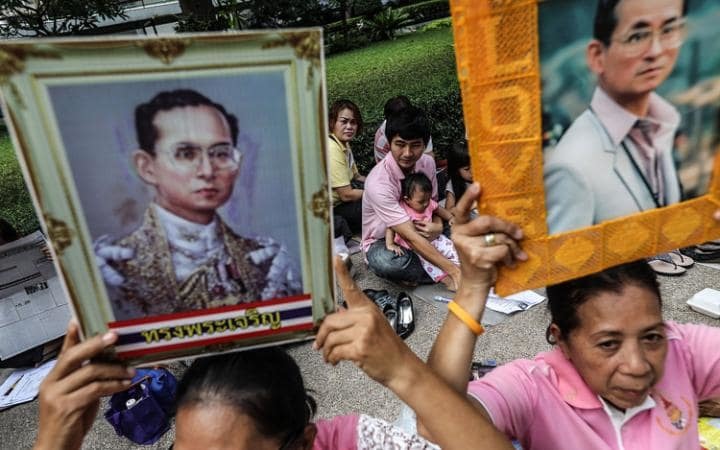Tourists in Thailand face disruption as country mourns death of king
A year of mourning has been announced following the death of Thailand’s beloved King Bhumibol Adulyadej, the world’s longest reigning monarch, at the age of 88, the Royal Palace announced on Thursday.
What does that mean for tourists in the country now and those planning to visit in the coming months?
In addition to a year of mourning, the Thai prime minister said that entertainment must be “toned down” for a month, according to the AFP.
In response, the Foreign Office (FCO) has issued an alert advising Britons in the country how to behave. “You should respect the feelings and sensitivities of the Thai people at this time,” it said. “Access to entertainment, including restaurants, bars and shopping areas may be restricted and you should behave respectfully when in public areas; if possible, wear sombre and respectful clothing when in public; check local media regularly and follow the advice of local authorities.”
His Majesty is considered to be am almost god-like figure to his people and tonight the atmosphere across Thailand is one of deep loss, with friends and families gathering together to mourn and pray for their King. In Bangkok, the normal bustle of the streets has been replaced with tuk-tuk drivers in tears and shop-keepers, market stalls, bars and restaurants slowly shutting up shop.
In the other big tourism hot spots around the country, there is a similar sense of subdued shock.
Wendy Cramond, a British tourist on holiday in Chiang Mai with her family, said: “Although I was initially concerned at the impact this might have on our travel plans, the hotel is running as usual at the moment and we have had no news of any immediate changes.
“We feel sad for the Thai people as the King was clearly revered. We just need to keep our fingers crossed that we can enjoy our next few days whilst being respectful of the people’s need to mourn.”
Reuters was reporting that the Thai prime minster had ordered for troops to be stationed around the country to increase national security.
In accordance with the FCO’s statement, it is reasonable to assume that Friday will bring a further outpouring of public emotion and an extensive shutdown of government and business across the country. Observers suggest it is also likely that entertainment activities will be severely restricted over the next 30 days, including the possible cancellation of the Koh Phangan’s famous full moon party, next due on October 17.
The sale and consumption of alcohol may also be banned for a short period, as is often the case for religious occasions and remembrances in Thailand. However, it is currently understood that large shopping malls, tourist attractions and beaches will remain open for now.
What should tourists do?
During this sensitive time, as a gesture of respect, tourist should wear black or dark-coloured clothing, which covers the shoulders and below the knee, and remain sensitive to the very real grief of the Thai people. In addition, it is advisable to refrain from entering into any discussion of politics or making any derisory comments about the royal family or current situation.
What about lese majeste?
Insulting the monarchy is a criminal offence under the country’s draconian lese majeste laws; falling foul of it could lead to many years imprisonment, even for tourists. Steering clear of anything that may breach this law will be even more pertinent over the coming months.
At a glance | What are Thailand’s lèse majesté laws?
As the royal family is highly revered in Thai society, the laws are in place to protect the most senior members of the country’s monarchy from insults or threats.
In a law that goes back to 1908, the country’s criminal code states anyone who “defames, insults or threatens” the king, the queen, the heir-apparent or the regent will be punished with up to 15 years in prison.
Anyone can report an allegation of lèse majesté, and the accusation can be made against anyone - including the monarch’s family.
So serious is the crime in Thailand, that the police are formally obliged to investigate all complaints, yet details of the charges are rarely publicised to avoid repeating the offensive remarks.
Those who fall foul of the law range from unsuspecting tourists to prominent politicians as well as extended members of the royal family. Human rights activists claim the laws have been used as a political weapon to stifle free speech.
Source: The Telegraph
